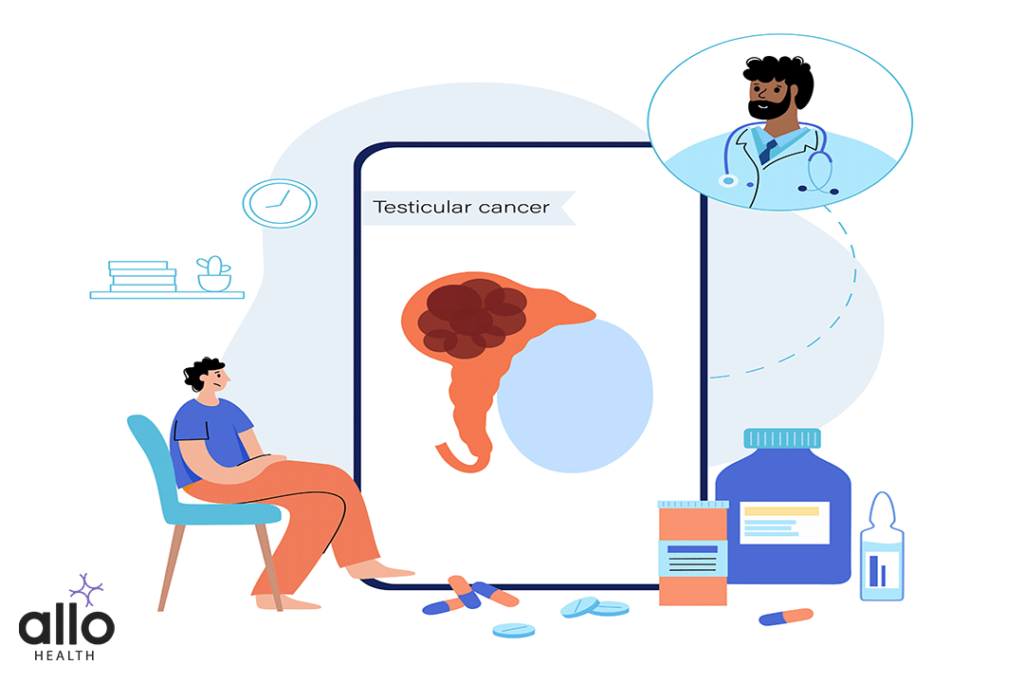Prostate And Sexual Health: What You Need To Know

Allo Health is dedicated to personalized well-being, offering support and trusted information tailored to individual health goals. The platform emphasizes human-generated content, led by a distinguished medical team of experts, including physicians and sexual health specialists. Their commitment to credibility involves rigorous fact-checking, authoritative research, and continuous updates to ensure accurate, up-to-date information. Allo Health's unique approach goes beyond conventional platforms, providing expert-led insights and a continuous commitment to excellence, with user feedback playing a crucial role in shaping the platform's authoritative voice.

A Psychotherapist with Clinical specialization, working for over seven years now. Areas of specialization range from Anxiety-related disorders, Mood-related disorders, Personality disorders, Sexual dysfunctions & other mental health issues.
Why This Was Upated?
Our experts continually monitor the health and wellness space, and we update our articles when new information became available.
Updated on 24 June, 2024
- Article was updated as part of our commitment to diversity, equity, and inclusion.

"The following blog article provides general information and insights on various topics. However, it is important to note that the information presented is not intended as professional advice in any specific field or area. The content of this blog is for general educational and informational purposes only.
Book consultation
The content should not be interpreted as endorsement, recommendation, or guarantee of any product, service, or information mentioned. Readers are solely responsible for the decisions and actions they take based on the information provided in this blog. It is essential to exercise individual judgment, critical thinking, and personal responsibility when applying or implementing any information or suggestions discussed in the blog."
Sexual health concerns and discomfort can plague anyone, regardless of gender. But men shy away from discussing such concerns due to the stigma associated with it. One such area men tend to face difficulties with is the prostate, a small gland in the male reproductive system.
It is natural for the gland to change shape and size as the man ages. However, if it grows too much, it can cause discomfort during sex and urination. Men often endure this discomfort rather than speaking openly and receiving appropriate medical help. But this only leads to further complications, which worsen the situation.
That is why it is essential to keep track of your prostate health for your overall sexual well-being.
What Is The Prostate And How Is It Connected To Sexual Health?
The prostate is a small gland that plays a crucial role in male sexual function. It produces a milky fluid that mixes with the semen. This fluid has two important roles in maintaining male fertility:
- The fluid is slightly alkaline, which is essential to balance the acidity of the vagina so the sperm can live longer.
- The fluid also has enzymes that reduce the thickness of semen which makes it easier to secrete.
A healthy prostate is the size of a small walnut and weighs about 30 grams. However, with age, the gland starts to grow in size. The gland is located in the middle of the pelvis, with the urethra passing through it. That’s why an enlarged prostate could cause discomfort during urination.
There are various conditions that affect the gland, but most of them have common symptoms. If you feel any discomfort it is best to seek professional medical advice.

Diseases Affecting The Prostate Gland
The prostate gland is mainly affected by three diseases, all characterized by an enlargement of the gland. That’s why any concerns related to this require a professional diagnosis, as the symptoms are so similar.
Prostatitis: This is the inflammation of the prostate gland caused due to bacterial infection or age-related factors. Bacterial prostatitis is easily cured by antibiotics, while the non-bacterial form requires extended care. However, it is a very common condition and doesn’t cause any further health concerns.
Benign Prostate Enlargement: Sometimes ageing contributes to an enlarged prostate gland, which obstructs urine passage through the urethra. Though it isn’t life-threatening, the discomfort and concerns relating to urination can affect your everyday life. Symptoms of enlarged prostate include loss of bladder control, weak urine stream, urinary retention, bladder infections etc.
Risk Of Cancer: Prostate cancer is one of the most common cancers in men aged above 50 years. However, early-stage cancer is highly curable as the malignant cells are restricted to the prostate gland itself. Risk factors for prostate cancer include family history, age, diet, genetic mutations, race, STIs, hormone levels.
In all prostate-related concerns, early detection is key. With the right diagnosis and treatment, most cases are cured or managed to a large extent.
What Causes These Diseases?
There are several causes of diseases affecting the prostate, including:
- Age: As men get older, the risk of developing such conditions increases.
- Genetics: Some diseases, such as prostate cancer, seem to run in families and may be related to inherited genetic mutations.
- Hormones: An imbalance of male hormones such as testosterone can affect the area.
- Lifestyle factors: Some studies have shown that a diet high in saturated fat and red meat may increase the risk of cancer. A sedentary lifestyle, obesity and smoking also can increase risk. Hence, lifestyle recommendations are often made.
- Other health conditions: Men with certain medical conditions, such as diabetes, may be at higher risk of affecting the area.
Note that these may increase the risks of developing prostate-related conditions, but they do not necessarily cause them. It’s important to consult a urologist if you notice any symptoms.
Test To Check For Benign Prostatic Hyperplasia
There are several tests that can be used to check for known as benign prostatic hyperplasia (BPH). The most common tests include:
- Digital rectal exam (DRE):This is a physical exam in which a doctor inserts a gloved finger into the rectum to feel the prostate and check for any lumps or other abnormalities.
- Prostate-specific antigen (PSA) test:This is a blood test that measures the level of PSA, a protein produced by the prostate. Elevated PSA levels can be a sign of cancer or BPH.
- Urinalysis:This test checks for any blood or infection in the urine and can help identify any concerns that may affect the urinary tract.
- Urodynamic Tests:These tests measure the flow of urine and the pressure inside the bladder and urethra to check for any blockages or other concerns.
- Transrectal ultrasound (TRUS):This test uses sound waves to help detect any abnormalities or enlargement in the gland.
These tests are not definitive and only serve as a guide, a biopsy may be needed to confirm the diagnosis. Your doctor will determine which test(s) are appropriate for you based on your symptoms and medical history.

What Are The Treatment Options For Benign Prostatic Hyperplasia?
- Alpha-blockers and 5-alpha reductase inhibitors are the most commonly used medications to treat BPH. Alpha-blockers help relax the muscles in the prostate and bladder neck, making it easier to urinate. 5-alpha reductase inhibitors work by decreasing the size of the gland for people with BPH.
- Phosphodiesterase-5 inhibitors (PDE5 inhibitors) are a class of medications that are usually used for the treatment of erectile dysfunction(ED), but some studies have shown that they may be effective in treating lower urinary tract symptoms (LUTS) associated with benign prostatic hyperplasia (BPH). Examples of PDE5 inhibitors include Sildenafil (Viagra), Tadalafil (Cialis) and Vardenafil (Levitra).
- Minimally invasive therapies include transurethral microwave thermotherapy (TUMT) and transurethral needle ablation (TUNA), which use heat to shrink the gland and transurethral resection of the prostate (TURP), which removes excess tissue. TURP is the most invasive option.
- Surgical option is recommended for patients with severe symptoms or BPH. The most common surgical procedures for BPH include transurethral resection of the prostate (TURP) and open prostatectomy.
When Should You See A Doctor?
Some of the symptoms related to prostate-related concerns may overlap with other seemingly harmless conditions. However, if you have one or more of these symptoms, you need to visit a doctor immediately.
- Unable to pass urine, even if you have the urge
- Frequency of incontinence or urination disrupting your sleep or other day-to-day activities
- Not getting nocturnal erections or ‘morning wood’
- Dissatisfaction with sexual life (all or most of the time)
- A change in smell, colour, or appearance of blood in the urine
- Painful urination or discomfort in the pelvic area usually increases after urination
A healthy prostate is crucial not just for your sexual health but for your overall well-being. Regular checkups and doctor visits can keep any related diseases at bay. The key is to speak openly about any concerns related to your sexual health so you receive treatment on time.
Key Takeaways
- Sexual health concerns affect individuals regardless of gender, but men often hesitate to discuss issues related to the prostate due to societal stigma.
- The prostate, a small gland in the male reproductive system, can cause discomfort during sex and urination if it grows excessively, emphasising the need for open communication and medical attention.
- As men age, the prostate naturally grows, potentially leading to urination discomfort due to its location around the urethra.
- Prostate-related diseases, including prostatitis, benign prostate enlargement, and prostate cancer, share similar symptoms and require professional diagnosis for proper treatment.
- Various factors, such as age, genetics, hormones, and lifestyle, can contribute to prostate-related conditions, underscoring the importance of seeking medical advice if symptoms arise.
- Effective treatment options for Benign Prostatic Hyperplasia (BPH) range from medications like alpha-blockers and 5-alpha reductase inhibitors to minimally invasive therapies such as TUMT and TUNA. In severe cases, surgical procedures like TURP or open prostatectomy may be recommended for effective management.
Frequently Asked Questions
Q: Does BPH cause premature ejaculation?
A: BPH (Benign Prostatic Hyperplasia) typically doesn’t directly cause premature ejaculation. However, it may indirectly affect sexual function, so consulting a healthcare provider is recommended for personalised advice.
Q: Can kegel exercises help improve symptoms of enlarged prostate?
A: Kegel exercises primarily target pelvic floor muscles, which may help improve urinary symptoms associated with an enlarged prostate. While they may not directly treat BPH, they can be a beneficial part of a holistic approach to prostate health.
Q: Does an enlarged prostate mean higher risk of prostate cancer?
A: Having an enlarged prostate (BPH) doesn’t necessarily mean a higher prostate cancer risk. However, both conditions can coexist, so regular check-ups are important for early detection and proper management.
Q: What is TUMT?
A: TUMT (Transurethral Microwave Thermotherapy) is a minimally invasive procedure that uses heat to destroy excess prostate tissues in individuals with BPH. It provides an alternative treatment option for those seeking relief from urinary symptoms associated with an enlarged prostate.
Q: Can BPH cause erectile dysfunction?
A: Yes, BPH (benign prostatic hyperplasia) can contribute to erectile dysfunction (ED). This occurs due to the proximity of the prostate to the erectile tissues. ED can also be caused by various factors, including heart disease, as it affects blood flow, a critical component for achieving and maintaining an erection. It’s important to address both BPH and any underlying health conditions for comprehensive treatment.







































